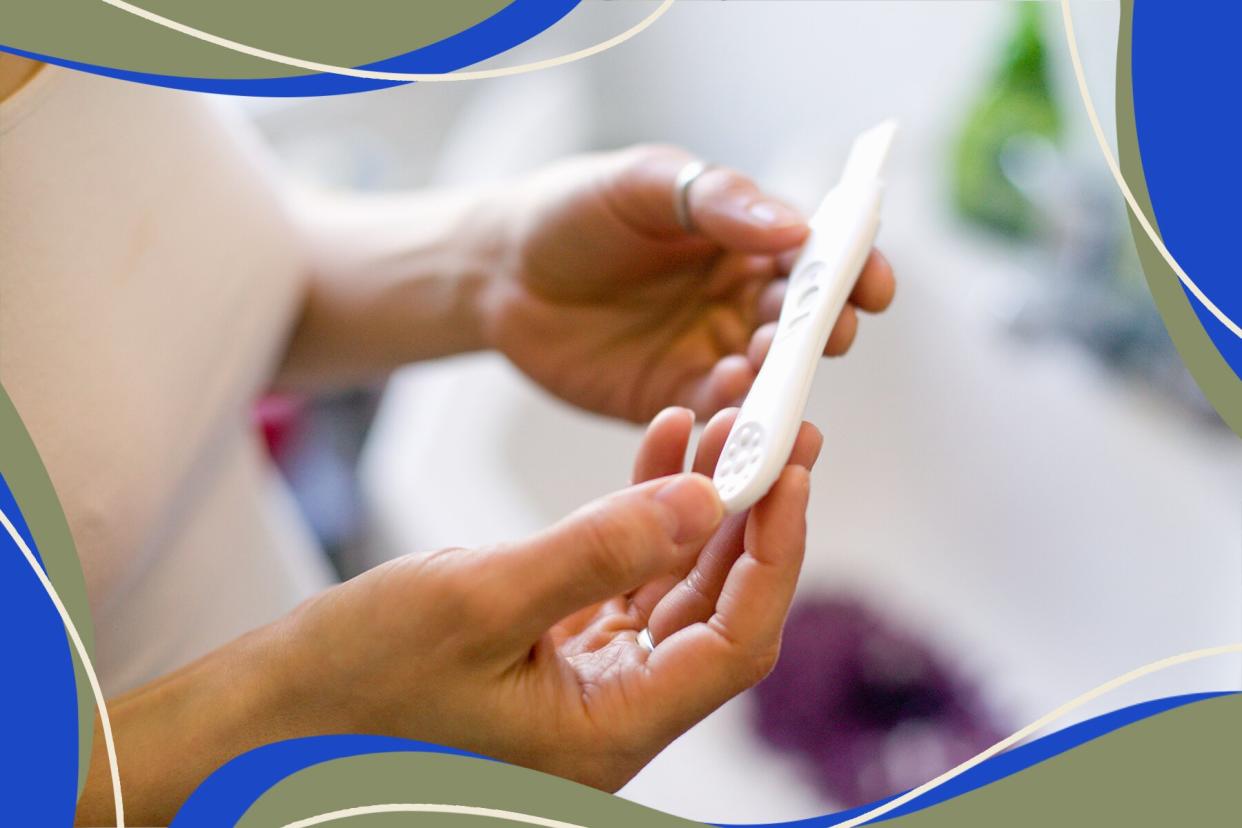What Is a Chemical Pregnancy, Exactly?

Zave Smith/Getty Images
Whether you're actively trying to get pregnant or a pregnancy might come as a surprise to you, it can be incredibly difficult, isolating, and even confusing to experience an early pregnancy loss.
You may hear these very early miscarriages referred to as a 'chemical pregnancy', and it's actually the most common type of pregnancy loss: American Pregnancy Association estimates that 50 to 75% of miscarriages can be described as a chemical pregnancy.
So what is it? Technically speaking, a chemical pregnancy a miscarriage that occurs within five weeks of implantation of an embryo in the uterine wall, most commonly one or two weeks after ovulation, according to Jane van Dis, MD, FACOG, an ob-gyn and Modern Fertility medical advisor.
In many cases, you may not even realize you're pregnant yet. Bleeding from a chemical pregnancy may happen right around the same time as your regular period, before you'd even think to take a pregnancy test. Of course, if you're hoping for that positive result or recently saw that plus sign, it's natural and expected to grieve the loss of what could have been a healthy baby — and chemical pregnancies are especially common when you're going through IVF, Dr. van Dis explains.
Most times, there is no specific cause of an early miscarriage, and it can't typically be attributed to the pregnant person or partner's health. That doesn't make it any easier, though. Here's a bit more about what to expect if you're going through a chemical pregnancy or at risk for pregnancy loss.
RELATED: 8 Possible Causes for a False-Positive Pregnancy Test
What are the symptoms of a chemical pregnancy?
"Many, if not most, women have no symptoms at all," says Nicole Rankins, M.D., an ob-gyn and host of the All About Pregnancy & Birth podcast. In some instances, it may seem like you're having a period that's a little bit heavier than normal, with cramps that are slightly worse. Since a chemical pregnancy can happen so soon after ovulation, some people may just interpret it as their period arriving on time or arriving a couple of days late. It could occur within five and a half weeks of ovulating though, which is right before you'd have an ultrasound at your doctor's office, so there's a chance you already were aware of the pregnancy.
If you think or know you're pregnant and notice some bleeding, don't panic right away. "One in four women experience bleeding in the first trimester, so bleeding alone during pregnancy isn't an indication that you've had a miscarriage," Dr. van Dis says. It is best to do a quick check-in with your doctor at least over the phone if you do notice some bleeding or cramping, though.
RELATED: Why Couples Fight After Miscarriage, and What to Do About It
Why do chemical pregnancies happen?
There isn't really a rhyme or reason for why chemical pregnancies happen so often. "Risk factors include chromosomal abnormalities, which are the most common cause, followed by hormone levels that can't support a pregnancy, and improper implantation," explains Dr. van Dis.
Having a naturally thin uterine lining might also play a role, says Kameelah Phillips, M.D., an ob-gyn and founder of Calla Women's Health. And if you're prone to any other uterine abnormalities, including fibroids, this may contribute to risk for early miscarriages. However, it's important to reiterate that a chemical pregnancy, or miscarriage at any stage of pregnancy, is not your fault, and there is nothing you could have done to avoid it.
What should you do if you have a chemical pregnancy?
If you've already gotten a positive pregnancy test result and notice quite a bit of bleeding or cramping, get in touch with your doctor to make an appointment within the week. It would be a good idea to call right away if you have a history of ectopic pregnancy (a pregnancy in which the implantation of the embryo happens outside the uterus), Dr. Phillips advises. Your ob-gyn would run tests and do an ultrasound in that case, adds Dr. van Dis.
Another instance where you should call the doctor right away is if you experience really heavy bleeding. That would look like going through a pad or tampon every hour for a few hours, says Dr. Rankin. "If you have severe abdominal pain, especially on one side, that can also be a sign of an ectopic pregnancy," she says. When you do see your ob-gyn, they won't typically need to perform any kind of procedure at this stage of pregnancy. (A later stage pregnancy loss often requires a D&C procedure, says Dr. Phillips, which involves removing excess tissue from the inside of the uterus.)
But again, often, you may not even be aware that you were pregnant, in which case there's no reason to stay home or be on bed rest, the experts say — the bleeding may be no different than your regular period.
RELATED: No Matter How You Feel About Abortion, You Need to Better Understand D&C
A chemical pregnancy can still feel like a huge loss.
Though it's not technically an emergency situation to have a pregnancy loss this early in the game and doesn't require serious medical care, it may still feel like a huge loss. This will likely be long before you told anyone you were pregnant, so it can seem like there's no one who can understand right now. Take time to care for yourself, even if that means taking a few mental health days, and schedule an appointment with a mental health professional, if you'd like to speak to someone about it. Pregnancy loss support groups and online resources can also help to remind you that you're not alone.

